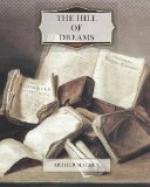a very terrible brute with a hideous mouth and hairy
tiger-like claws when seen through the microscope;
but Lucian had taken away the microscope from his eyes.
He could now walk the streets of Caermaen confident
and secure, without any dread of interruption, for
at a moment’s notice the transformation could
be effected. Once Dr. Burrows caught him and made
him promise to attend a bazaar that was to be held
in aid of the Hungarian Protestants; Lucian assented
the more willingly as he wished to pay a visit to certain
curious mounds on a hill a little way out of the town,
and he calculated on slinking off from the bazaar
early in the afternoon. Lord Beamys was visiting
Sir Vivian Ponsonby, a local magnate, and had kindly
promised to drive over and declare the bazaar open.
It was a solemn moment when the carriage drew up and
the great man alighted. He was rather an evil-looking
old nobleman, but the clergy and gentry, their wives
and sons and daughters welcomed him with great and
unctuous joy. Conversations were broken off in
mid-sentence, slow people gaped, not realizing why
their friends had so suddenly left them, the Meyricks
came up hot and perspiring in fear lest they should
be too late, Miss Colley, a yellow virgin of austere
regard, smiled largely, Mrs. Dixon beckoned wildly
with her parasol to the “girls” who were
idly strolling in a distant part of the field, and
the archdeacon ran at full speed. The air grew
dark with bows, and resonant with the genial laugh
of the archdeacon, the cackle of the younger ladies,
and the shrill parrot-like voices of the matrons;
those smiled who had never smiled before, and on some
maiden faces there hovered that look of adoring ecstasy
with which the old maidens graced their angels.
Then, when all the due rites had been performed, the
company turned and began to walk towards the booths
of their small Vanity Fair. Lord Beamys led the
way with Mrs. Gervase, Mrs. Dixon followed with Sir
Vivian Ponsonby, and the multitudes that followed
cried, saying, “What a dear old man!”—“Isn’t
it kind of him to come all this way?”—“What
a sweet expression, isn’t it?”—“I
think he’s an old love”—“One
of the good old sort”—“Real
English nobleman”—“Oh most
correct, I assure you; if a girl gets into trouble,
notice to quit at once”—“Always
stands by the Church”—“Twenty
livings in his gift”—“Voted
for the Public Worship Regulation Act”—“Ten
thousand acres strictly preserved.” The
old lord was leering pleasantly and muttering to himself:
“Some fine gals here. Like the looks of
that filly with the pink hat. Ought to see more
of her. She’d give Lotty points.”
The pomp swept slowly across the grass: the archdeacon had got hold of Mr. Dixon, and they were discussing the misdeeds of some clergyman in the rural deanery.
“I can scarce credit it,” said Mr. Dixon.
“Oh, I assure you, there can be no doubt. We have witnesses. There can be no question that there was a procession at Llanfihangel on the Sunday before Easter; the choir and minister went round the church, carrying palm branches in their hands.”




